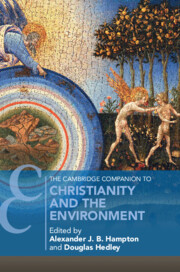Book contents
- The Cambridge Companion to Christianity and the Environment
- Cambridge Companions to Religion
- The Cambridge Companion to Christianity and the Environment
- Copyright page
- Contents
- Figures
- Contributors
- Preface
- 1 Introduction
- Part I Concepts
- Part II Histories
- Part III Engagements
- 14 The Sublime and Wonder
- 15 Religious Traditions and Ecological Knowledge
- 16 Venerating Earth
- 17 Nature and Aesthetics
- 18 Sophia and the World Soul
- 19 Creation and Gender
- Index
- Cambridge Companions to Religion
- References
18 - Sophia and the World Soul
from Part III - Engagements
Published online by Cambridge University Press: 21 July 2022
- The Cambridge Companion to Christianity and the Environment
- Cambridge Companions to Religion
- The Cambridge Companion to Christianity and the Environment
- Copyright page
- Contents
- Figures
- Contributors
- Preface
- 1 Introduction
- Part I Concepts
- Part II Histories
- Part III Engagements
- 14 The Sublime and Wonder
- 15 Religious Traditions and Ecological Knowledge
- 16 Venerating Earth
- 17 Nature and Aesthetics
- 18 Sophia and the World Soul
- 19 Creation and Gender
- Index
- Cambridge Companions to Religion
- References
Summary
The idea of the world soul is a distinctive Platonic doctrine. It is particularly significant in late Antique thought, the 12th century Renaissance, the Italian Renaissance. It is transmitted via the Cambridge Platonists, mystical pietism, Cabbala and the Spinoza revival to German Romantic period and the great age of Russian literature. Historically, it has been either loosely associated with or even identified with the Divine Sophia. This Divine Wisdom itself has a complex reception history, and constitutes a conspicuous feminine image of the Divine, and is relevant to recent discussions about the intellectual inheritance of Western Christian thought and the ecological crisis.
- Type
- Chapter
- Information
- The Cambridge Companion to Christianity and the Environment , pp. 286 - 302Publisher: Cambridge University PressPrint publication year: 2022



